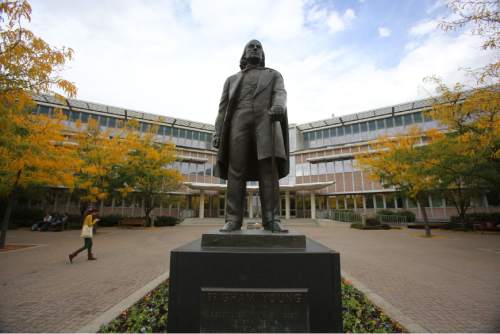This is an archived article that was published on sltrib.com in 2016, and information in the article may be outdated. It is provided only for personal research purposes and may not be reprinted.
The Salt Lake Tribune won, in part, an appeal to the State Records Committee on Thursday, requiring the Provo and Orem police departments to provide a report showing any instances of Brigham Young University officers accessing the two agencies' records through a shared countywide database.
Jessica Miller, a Tribune reporter, filed the appeal in July after the two agencies denied her initial requests, filed May 25. The records would contribute to the newspaper's investigation of students' assertions that they were targeted by BYU's Honor Code Office after reporting sexual assaults.
The Tribune previously obtained documents showing that one BYU police lieutenant accessed a Provo police record, purportedly so he could collect information for an Honor Code investigation into a female student who filed a rape case. He read the report by using the countywide database shared by 22 law enforcement agencies in Utah County, including Provo, Orem and BYU police.
Because BYU, which is owned by The Church of Jesus Christ of Latter-day Saints, is a private institution, it asserts that the BYU Police Department is not subject to records requests. The university has repeatedly stressed that the police department and Honor Code Office — which oversees the school's ban on alcohol, premarital sex and other conduct-based regulations — are separate.
The case logs, though, register details on the time, date and user who accesses a report, as well as what the user does with the document: view, print or amend. Each user is identified first by a two-digit code for his or her agency and then by name.
The State Records Committee unanimously voted Thursday to require Orem and Provo police to compile for The Tribune a report listing when a BYU user accessed an Orem or Provo record on the database — redacting the user ID and details about the case, such as names of suspects or victims.
Attorneys representing Provo and Orem police initially requested that the appeal be dismissed Thursday for filing errors made by The Tribune, but the committee denied the request.
During the hearing, Camille Williams, representing Provo police, said the two law enforcement agencies would have to create a database report that "does not exist as a record," so the request should be denied. Williams also said it would be impossible to produce the report.
Chris Black, a systems administrator for the database, testified for the police agencies, saying there's no feasible way to compile the data into a report without a third-party software, which some of the agencies don't have.
The police agencies also argued that releasing the data would interfere with two Utah Department of Public Safety (DPS) investigations examining potential BYU violations related to access of the sexual assault reports, said Kevin Bolander, of the Utah attorney general's office.
According to Utah's Government Records Access and Management Act, or GRAMA, any public employee who has lawful access to protected records and improperly shares that information could be charged with class B misdemeanor, which carries a maximum penalty of six months in jail and a $1,000 fine.
Bolander has reviewed records from the database logs during the investigation, he said, and worries about potentially classified and "sensitive information" being made public. The committee, however, said if Bolander and others working on the DPS investigation have access to reports generated from the case logs, it would be possible to compile the data in accordance with The Tribune's request.
"If they pulled it for [Bolander] to look at it," said committee member David Fleming, "they can pull it for The Tribune and redact portions."
Though blocking out the usernames will limit investigations into whether certain BYU police officers consistently view external reports more than others, Miller accepted the proposed redactions, instead of a "blanket denial."
As part of her appeal, Miller said she requested the records before they were classified as "protected" on May 26, when the investigation began at the request of BYU and Provo police. Additionally, she argued, divulging the frequency of BYU's database access doesn't "reasonably" interfere with the investigation.
The attorney representing Orem, Heather Schriever, disagreed, saying it's "unclear" who owns the rights to the data — the police groups or Spillman, the company that provides the database — meaning it may not be in the two agencies' jurisdiction to release the information. Committee members rejected the argument, noting that until ownership is determined, the law enforcement agencies must produce the request because their records comprise the case-log database.
The committee partially granted Miller's request, requiring Orem and Provo police to produce a database report covering the past 18 months — the agencies delete any older data periodically to save space on servers, Black said. Miller originally requested records of BYU police officers' viewing of the case logs from January 2010 to present.
The report would also include any instance of a BYU user viewing a case — rather than solely sexual assault cases — because the database doesn't allow records to be sorted by type.
"The public should be allowed access to these records and to know how a police force at a private university is accessing information in a database owned by public agencies," Miller said after the nearly two-hour hearing.
The Utah County Commission recently made a similar ruling, granting The Tribune partial access to logs requested of the Utah County Sheriff's Office.
Orem and Provo police have 30 days to appeal the decision to a district court judge. The two agencies, Williams said, will "review and decide what we can comply with" before responding to the committee's decision.
Twitter: @CourtneyLTanner



